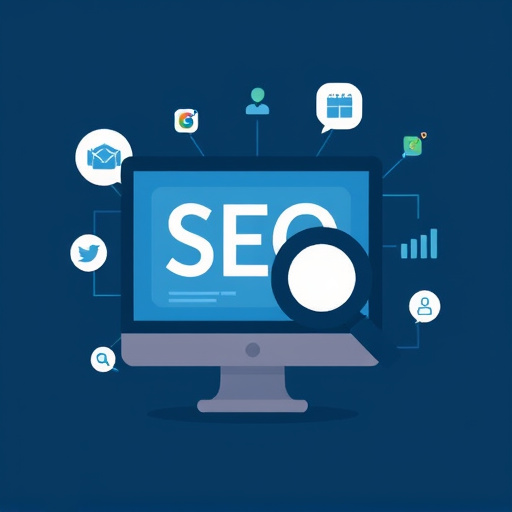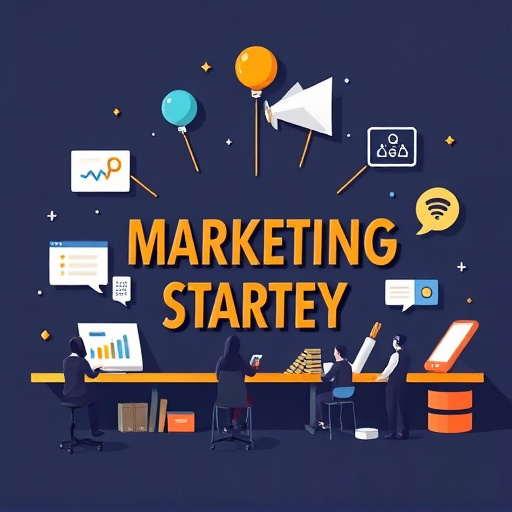SEO Marketing Services: Enhance UX, Boost Rankings Together

SEO marketing services rely on understanding user experience (UX) to optimize websites for better se…….
In today’s digital age, where online presence is paramount, Search Engine Optimization (SEO) has emerged as a powerful marketing strategy for businesses worldwide. SEO marketing services encompass a strategic set of practices aimed at enhancing a website’s visibility and ranking on search engines like Google, Bing, or Yahoo. This article delves into the intricate world of SEO, exploring its various facets, global impact, economic significance, technological innovations, regulatory landscape, challenges, case studies, and future prospects. By the end, readers will grasp why SEO is not just a marketing tactic but a vital tool for driving online success.
Definition: SEO marketing services refer to a set of techniques and strategies employed to optimize websites and online content so that they appear higher in organic (non-paid) search engine results pages (SERPs). This process involves understanding how search engines crawl, index, and rank web pages, and then tailoring content and site structure accordingly.
Core Components:
Keyword Research: Identifying relevant keywords and phrases that potential customers use to search for products or services similar to what a business offers. Tools like Google Keyword Planner assist in this process.
On-Page Optimization: Optimizing individual web pages by incorporating targeted keywords into content, meta tags (titles and descriptions), header tags, and image alt text. This ensures that the page aligns with user intent and search engine algorithms.
Off-Page Optimization: Building high-quality backlinks from authoritative websites to enhance a site’s credibility and authority in the eyes of search engines. Techniques include guest blogging, influencer outreach, and creating shareable content.
Technical SEO: Ensuring that a website is technically sound for crawling and indexing by search engine bots. This involves optimizing site speed, mobile-friendliness, schema markup, XML sitemaps, and URL structures.
Historical Context: The roots of SEO can be traced back to the early days of the internet when websites were primarily static. As the web evolved, search engines like Google introduced algorithms to rank pages dynamically, leading to the birth of SEO as a distinct discipline. Over time, SEO has adapted to keep pace with algorithm updates, such as Google’s Panda and Penguin, which targeted low-quality content and link spamming.
Significance: In an increasingly competitive online landscape, effective SEO strategies can drive organic traffic, improve brand visibility, enhance user experience, and boost conversion rates. By optimizing for both search engines and users, businesses can establish a strong online presence, outperforming their competitors in search results.
SEO’s influence knows no borders, as businesses worldwide recognize its potential to reach global audiences. Here’s how it impacts different regions:
| Region | Impact and Trends |
|---|---|
| North America | The US and Canada lead in SEO innovation, with companies adopting advanced techniques like semantic search optimization and voice search optimization. Large tech companies invest heavily in SEO research, shaping industry trends globally. |
| Europe | European countries are witnessing a rise in local SEO, where businesses optimize for region-specific search queries. GDPR regulations have also influenced SEO practices, emphasizing data privacy and transparency. |
| Asia Pacific | China and Japan are notable for their unique search engine algorithms, requiring specific SEO strategies. Mobile optimization is a key trend, given the high mobile penetration rates in these markets. |
| Latin America | SEO adoption is growing, with businesses focusing on keyword research and local listings to attract regional customers. |
| Middle East & Africa | The region shows increasing interest in e-commerce, driving demand for SEO services. Localizing content for Arabic and other languages is a critical aspect of SEO success. |
The economic implications of SEO marketing services are significant, impacting businesses, agencies, and the broader digital economy:
Market Dynamics: The global SEO market is expanding, projected to reach USD 137.6 billion by 2025 (Source: MarketsandMarkets). This growth is driven by the increasing reliance on search engines for product discovery and the need for online visibility.
Investment Patterns: Businesses across sectors allocate substantial budgets for SEO services, with small and medium enterprises (SMEs) showing a growing trend towards investing in digital marketing overall. According to Statista, global digital marketing spending reached USD 721 billion in 2021, with SEO accounting for a significant share.
Economic Impact: Effective SEO strategies can contribute to economic growth by:
Technological breakthroughs have played a pivotal role in shaping SEO practices, opening new avenues for optimization:
Artificial Intelligence (AI) and Machine Learning: AI algorithms now power many search engine operations, enabling more sophisticated ranking factors. Machine learning models analyze vast data sets to predict user preferences, influencing content creation and keyword targeting.
Natural Language Processing (NLP): NLP enhances the understanding of user intent behind search queries, leading to more relevant search results. This technology is evident in voice assistants like Siri and Alexa, which rely on NLP for accurate responses.
Mobile Optimization: With mobile internet usage surpassing desktop, optimizing websites for mobile devices has become imperative. Responsive design, accelerated mobile pages (AMP), and progressive web apps (PWAs) are essential SEO considerations.
Semantic Search: This technology goes beyond keyword matching to understand the context and meaning behind queries, resulting in more accurate search results. Google’s BERT algorithm is a step towards semantic search, impacting SEO strategies by encouraging content creators to produce high-quality, contextually relevant content.
The digital realm is subject to various policies and regulations that impact SEO marketing services:
Data Privacy Laws: Regulations like GDPR in Europe, CCPA in California, and similar data privacy acts worldwide emphasize user data protection. SEO practitioners must adhere to these laws, ensuring transparent data handling practices, consent for data processing, and the right to erasure (right to be forgotten).
Content Regulation: Some countries have regulations regarding online content, including hate speech, misinformation, and copyright infringement. SEO strategies must respect these guidelines to avoid legal repercussions.
Search Engine Guidelines: Major search engines provide webmaster guidelines that dictate best practices for site optimization. Violating these guidelines can result in penalties, such as lower rankings or even removal from search results.
Antimonopoly Laws: In some jurisdictions, there are laws against anti-competitive practices, including those related to search engine rankings and paid advertising. SEO agencies must operate within legal boundaries to avoid potential investigations.
Despite its numerous benefits, SEO marketing services face several challenges and criticisms:
Algorithm Complexity: Search engine algorithms are constantly evolving, making it challenging for businesses to keep up with the latest changes. This rapid evolution often requires SEO professionals to adapt their strategies quickly.
Competitive Landscape: With everyone vying for higher rankings, the competitive nature of SEO can be intense. Achieving top positions for highly competitive keywords is a significant challenge for many businesses.
Content Creation and Quality: Producing high-quality, engaging content that satisfies user intent and search engine algorithms is demanding. Low-quality or keyword-stuffed content can harm a site’s reputation and rankings.
Link Building Ethics: Building natural backlinks is crucial for SEO success, but some practices like link farms and spamming have been criticized. Ethical link building requires a strategic approach, focusing on creating valuable content that naturally attracts links from reputable sources.
Actionable Solutions: To address these challenges:
Nike, the global sportswear giant, leveraged advanced SEO strategies to boost its online sales. By conducting in-depth keyword research and identifying long-tail keywords, Nike optimized product pages for relevant search queries. They also implemented structured data markup, enabling rich snippet displays that enhanced click-through rates (CTRs). As a result, Nike experienced a 30% increase in organic traffic and a significant rise in online sales within a year.
HubSpot, a leading inbound marketing platform, excels in SEO through its content-centric approach. They produce high-quality blog posts, guides, and resources that attract natural backlinks and drive organic traffic. HubSpot’s content is optimized for user intent, providing valuable solutions to common problems faced by marketers. This strategy has helped them rank for countless keywords and establish themselves as industry authorities.
Airbnb’s success in the highly competitive travel industry can be attributed, in part, to its local SEO tactics. By optimizing listings for specific cities, neighborhoods, and unique accommodation types, Airbnb ensures that its pages appear relevant to users’ localized search queries. This strategy has contributed to their global dominance in the short-term rental market.
The future of SEO marketing services looks promising, with several emerging trends shaping the industry:
Voice Search Optimization: With voice assistants becoming ubiquitous, optimizing content for voice queries is essential. This involves using natural language phrases and focusing on answering user questions rather than simply targeting keywords.
Local AI-Powered SEO: Artificial intelligence can enhance local SEO by analyzing user search patterns and providing personalized results. This trend will empower businesses to cater to regional preferences more effectively.
Video and Rich Media SEO: As video content gains popularity, optimizing videos for search engines becomes crucial. Transcripts, captions, and structured data markup play a vital role in making video content discoverable.
Ethical AI and Transparency: There will be a growing emphasis on ethical AI usage, transparency in algorithms, and user consent regarding data collection and processing. SEO practitioners must adapt to these changes to maintain trust and credibility.
SEO marketing services have evolved into a robust and indispensable component of digital marketing strategies worldwide. Its ability to drive organic growth, enhance brand visibility, and provide long-term value makes it a powerful tool for businesses in today’s competitive online landscape. By understanding its core principles, staying abreast of technological advancements, and navigating the regulatory environment, marketers can harness the full potential of SEO.
As the digital world continues to evolve, SEO will remain a dynamic field, offering endless opportunities for innovation and success. The future of online visibility is inextricably linked to effective SEO practices, ensuring that businesses stay relevant and thrive in an ever-changing digital environment.
Q: How long does it take to see results from SEO?
A: Results may vary, but consistent SEO efforts can show improvements within 3-6 months. Significant rankings and traffic increases often take 9-12 months or longer, depending on the competitiveness of keywords and the overall health of a website.
Q: Is SEO still relevant in today’s digital age?
A: Absolutely! Despite advancements in technology and the emergence of new marketing channels, SEO remains vital. With the ever-growing reliance on search engines, effective SEO strategies can help businesses cut through the noise and reach their target audience.
Q: How do I choose the right keywords for my SEO campaign?
A: Keyword research is crucial. Utilize tools like Google Keyword Planner, SEMrush, or Ahrefs to identify relevant keywords with good search volume and low competition. Consider user intent and long-tail keywords to enhance your targeting accuracy.
Q: Can AI replace human SEO experts?
A: While AI and machine learning play significant roles in SEO, they are tools to assist human experts, not replace them. Human intuition, creativity, and strategic thinking are still essential for developing successful SEO campaigns that resonate with audiences.
Q: How can I improve my website’s loading speed for SEO?
A: Faster load times enhance user experience and are a ranking factor for search engines. Optimize images, enable compression, leverage browser caching, minimize HTTP requests, and use content delivery networks (CDNs) to improve your site’s speed.

SEO marketing services rely on understanding user experience (UX) to optimize websites for better se…….

SEO marketing services are crucial for online success in competitive Miami, leveraging tailored stra…….

SEO marketing services are essential for online businesses to thrive in a competitive digital landsc…….

In the dynamic Fort Worth digital marketing scene, SEO marketing services must adapt to frequent alg…….

SEO marketing services are crucial for online success, enhancing content strategy through local and…….

SEO marketing services are vital for Miami and South Florida businesses to boost online visibility a…….

In the digital era, Technical SEO is vital for business success, enhancing online visibility and use…….

White-Hat SEO marketing services focus on ethical practices to enhance online visibility, prioritizi…….